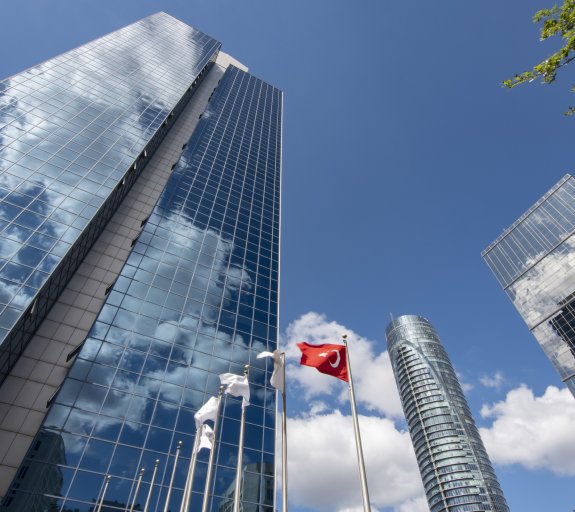
EM reaction: Turkish opposition obtains landslide victory in local elections
- 02 Abril 2024 (3 min de lectura)
Turkish opposition party obtains the largest share of votes at local elections
Preliminary results from Sunday March 31 local elections show the Republican People’s Party (CHP) having received 37.8% of the vote nationwide, while the ruling Justice and Development Party (AKP) received 35.5%. This is the first time in AKP’s history that it fails to take the largest share of the votes.
60% of the population under CHP authorities
Opposition party CHP won 14 out of 30 major provinces, 35 out of 81 provinces, 356 out of 973 districts. AKP and its junior coalition partner the Nationalist Movement Party (MHP) retained power in 32 provinces out of 81, down from 50 provinces back in 2019. Following local elections, more than 60% of the Turkish population live in areas under CHP local authorities against 25% for the ruling AKP. CHP won Ankara, Izmir and Istanbul with very high scores: M. Yavas obtained 60.4% of the votes in Ankara, almost twice as much as the AKP contender; with almost 49% of votes, M. Tugay obtained 12 points more than M Dag (AKP); CHP Istanbul mayor M. İmamoğlu retained power, casting 51% of the votes, that is 11 points more than M. Kurum from AKP, contradicting pre-election polls which were pointing to a very tight race.
The rebalancing of the economy through a return to orthodox policies to continue
The landslide victory of the opposition makes results difficult to contest. President Erdoğan conceded defeat on Sunday night and appeared committed to let his economic team pursue with implementing its macroeconomic rebalancing program. As such, the expected tightening of the fiscal policy should help tame inflationary pressures in a more meaningful manner as of next year while curtailing the recent buoyant economic activity (see more here about the latest 500bp rate hike delivered by the Turkish central bank).
Lowest turnout since 2004 weakened the AKP voter base while
With 48 million vote casted to the ballots out of 61 million eligible voters, Turkish local elections show a 78.1% turnout down from 84.7% in 2019, which is the lowest participation level since the 2004 local elections, likely coming from AKP’s traditional support. With double-digit inflation rate since November 2019, having reached a peak at 85.5% in October 2022 and still hovering at more than 67% at present, Turkish population has been under significant pressure in spite of massive fiscal stimulus pushed by President Erdoğan.
AKP-ally-party New Welfare Party (YRP) led by M. Erbakan turned rival
The YRP decided to run on their own during these local elections and came in third with more than 6% of votes that brought two municipalities to the conservative party. This has in turn further dented AKP support in polls.
Thinking ahead about 2028 general elections
Four years from now, Turkey will go back to polls to elect its next President. According to the Constitution, President Erdoğan (70 years old) is not allowed to rerun and his recent comments seem to comfort this. 2028 will be thus about President Erdoğan’s succession after being in power for decades. While 4 years is a long time, recent local elections bring into the spotlight two politicians willing to be part of Turkey’s post- Erdoğan era, namely the popular mayor of Istanbul, M. İmamoğlu (CHP) and M. Erbakan (YRP), the ambitious leader of the New Welfare Party, a party that he created back in 2018 which appears to be increasingly appealing to AKP’s disappointed conservative religious voters.
Disclaimer
Este documento tiene fines informativos y su contenido no constituye asesoramiento financiero sobre instrumentos financieros de conformidad con la MiFID (Directiva 2014/65 / UE), recomendación, oferta o solicitud para comprar o vender instrumentos financieros o participación en estrategias comerciales por AXA Investment Managers Paris, S.A. o sus filiales.
Las opiniones, estimaciones y previsiones aquí incluidas son el resultado de análisis subjetivos y pueden ser modificados sin previo aviso. No hay garantía de que los pronósticos se materialicen.
La información sobre terceros se proporciona únicamente con fines informativos. Los datos, análisis, previsiones y demás información contenida en este documento se proporcionan sobre la base de la información que conocemos en el momento de su elaboración. Aunque se han tomado todas las precauciones posibles, no se ofrece ninguna garantía (ni AXA Investment Managers Paris, S.A. asume ninguna responsabilidad) en cuanto a la precisión, la fiabilidad presente y futura o la integridad de la información contenida en este documento. La decisión de confiar en la información presentada aquí queda a discreción del destinatario. Antes de invertir, es una buena práctica ponerse en contacto con su asesor de confianza para identificar las soluciones más adecuadas a sus necesidades de inversión. La inversión en cualquier fondo gestionado o distribuido por AXA Investment Managers Paris, S.A. o sus empresas filiales se acepta únicamente si proviene de inversores que cumplan con los requisitos de conformidad con el folleto y documentación legal relacionada.
Usted asume el riesgo de la utilización de la información incluida en este documento. La información incluida en este documento se pone a disposición exclusiva del destinatario para su uso interno, quedando terminantemente prohibida cualquier distribución o reproducción, parcial o completa por cualquier medio de este material sin el consentimiento previo por escrito de AXA Investment Managers Paris, S.A.
La información aquí contenida está dirigida únicamente a clientes profesionales tal como se establece en los artículos 194 y 196 de la Ley 6/2023, de 17 de marzo, de los Mercados de Valores y de los Servicios de Inversión.
Queda prohibida cualquier reproducción, total o parcial, de la información contenida en este documento.
Por AXA Investment Managers Paris, S.A., sociedad de derecho francés con domicilio social en Tour Majunga, 6 place de la Pyramide, 92800 Puteaux, inscrita en el Registro Mercantil de Nanterre con el número 393 051 826. En otras jurisdicciones, el documento es publicado por sociedades filiales y/o sucursales de AXA Investment Managers Paris, S.A. en sus respectivos países.
Este documento ha sido distribuido por AXA Investment Managers Paris, S.A., Sucursal en España, inscrita en el registro de sucursales de sociedades gestoras del EEE de la CNMV con el número 38 y con domicilio en Paseo de la Castellana 93, Planta 6 - 28046 Madrid (Madrid).
Advertencia sobre riesgos
El valor de las inversiones y las rentas derivadas de ellas pueden disminuir o aumentar y es posible que los inversores no recuperen la cantidad invertida originalmente.



